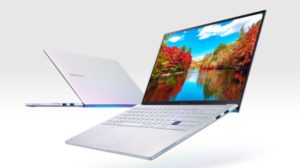
Samsung has announced two new laptops — The Galaxy Book Flex and the Galaxy Book Ion — at the Samsung Developer Conference 2019 in San Jose, California, that feature Windows Hello, the biometric security platform built into Windows 10.
Though they share some specs, the laptops do also have their own unique qualities as well. While the Flex features a 360 degree hinge and boasts a 2-in-1 design, with a touchscreen and S-Pen capability, the Ion is thinner and more lightweight with a unique feature that sees the back of the display prop up the keyboard slightly.
Both laptops are the first ever to feature Samsung’s QLED (Quantum Dot Light Emitting Diode) display technology, and boast Intel’s 10th generation processors onboard certifying them as part of Intel’s Project Athena, the company’s 10nm technology that promises all-day battery life while maintaining performance and responsiveness.
Samsung’s Wireless PowerShare technology is also featured in both laptops. It allows users to charge their Qi-compatible smartphones including Samsung’s Galaxy and Note lineups, the iPhone and the new Pixel 4, as well as Samsung’s own Galaxy Buds wireless headphones, by placing them on the laptops’ trackpad.
The inclusion of biometric security for the Galaxy Book Flex and Galaxy Book Ion make them compatible with Windows Hello, which has been around for years but has recently seen increased adoption in the laptop market. Just a few weeks ago Dynabook announced three new laptops of their own with fingerprint scanners and Windows Hello integration. The Protégé X30, Tecra X40 and Tecra X50 are among the first laptops to meet the Windows Secured-core PC requirements.
Though there is no official word yet if the Galaxy Book Flex and Ion also meet these requirements, this year has seen a notable shift toward the addition of biometric security to new laptops from some of the world’s leading OEMs.

Follow Us